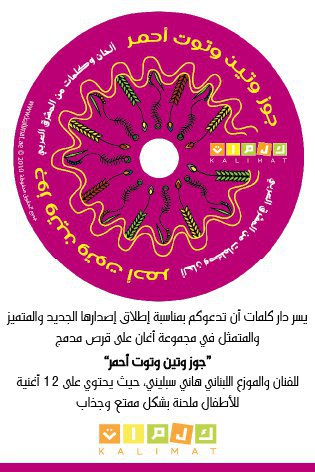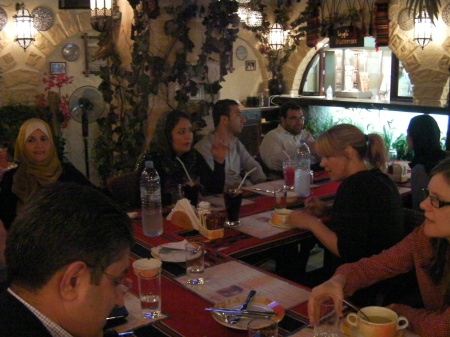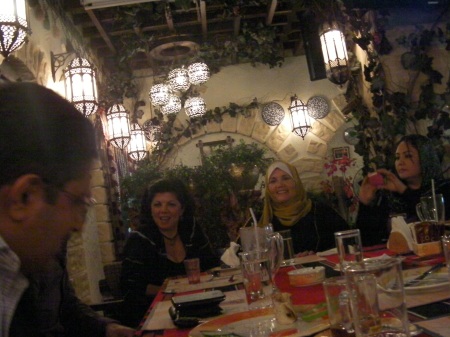تحية طيبة أصدقائي مع كل اطلالة معرض الشارقة للكتاب ![]()

في الواقع لم اكن متشجعة على شراء الكثير من الكتب لاسباب منها
* قلة الاصدارات الجديدة المعروضة في دور النشر .
* وجود بعض الكتب في مكتبتي لم تُقرا من العام الماضي !
* إفلاس الروايات العربية من الاتيان بشيء جديد الا فيما ندر ..
* غلاء اسعار الكتب مقارنة بالاعوام السابقة جعلني لا اقتني الا ما انا متاكدة من اني سوف اقرأه.
* تراجع مستوى نهمي للقراءة بفضل صديقي الصدوق الانترنت ![]()
—-
عموما اليكم القائمة ![]()
من دار النيل – تركيا كان لي :-
1 – رواية ” عودة الفرسان” / فريد النصاري .
* وهي سيرة محمد فتح الله كولن .
2 – آخر الفرسان / فريد الانصاري.
* وهي حول حياة بديع الزمان النورسي .
- مجموعة جميلة لمحمد فتح الله كولن
3 – موزاين أو أضواء على الطريق .
4- ونحنُ نقيم صرح الروح .
5- طرق الارشاد في الفكر والحياة .
6- القدر في ضوء الكتاب والسنة .
7 -مولانا جلال الدين الرومي / أ.د.جيهان أوقويوجو .
——
ومن دار الكتاب العربي – القاهرة :-
8-المعلقات العشر /شرح الشنقيطي .
ومن دار السلام – مصر :-
9- تربيتنا الروحية / سعيد حوّى .
——
ومن المؤسسة العربية للدراسات و النشر :-
10- رواية “سعادة السفير ” / غازي القصيبي .
11 – حياة في الإدارة / غازي القصيبي .
13 - الحرية و الطوفان / حاكم المطيري .
—–
ومن الدار العربية للعلوم :-
14 – الأمير بندر / وليام سيمبسون
——-
ومن دار الانتشار العربي – بيروت
15 – الرقّ في بلاد المغرب والأندلس / عبد الإله بنمليح.
16-” المرأة المفاهيم والحقوق ” قراءة جديدة لقضايا المرأة في الخطاب الديني / أحمد القبانجي .
—–
من دار الساقي
17 – أحاديث مع والدي أدونيس / نينار إسبر .
—–
18- كيف تنمي ثقافتك / د علي حمزة العمري
—-
كان المعرض اليوم هادئا خلال وقت الظهيرة ، التقيت ببعض الصديقات ، تبادلنا عناوين الكتب و تعاونّا على الوصول الى بعض دور النشر والكتب ، اجرت معي ادارة المعرض مقابلتين ، زرت المركز الاعلامي الذي تتطوع فيه بعض الصديقات ، لم احضر اية فعالية لان وقت الفعاليات يكون في المساء .. لم تكن لي اية مغامرات لان المعرض كان خاليا ![]()
أخيرا في حال وجود أيّة اضافة الى قائمة الكتب ساقوم بتحديث هذه التدوينة ان شاء الله تعالى ..
“صور متفرقة من المعرض “
* منشورات الجمل – ألمانيا
دار نشر – كلمات – للاطفال التابعة للشيخة بدور القاسمي ،
مميزة جدا و طبعاتها فاخرة واسعارها افخم ![]()
مجموعة آدم و الاصدقاء لصديقتي على تويتر المدونة شيماء البشتاوي
“زاوية من المعرض “
——
تجربتي مع معرض الكتاب العام الماضي تجدونها ” هنا “
سأكون مسرورة اذا شاركتموني قائمة مشترياتكم من المعرض
![]()
اللهم علمنا ما ينفعنا وانفعنا بما علّمتنا ~
كل التقدير






















